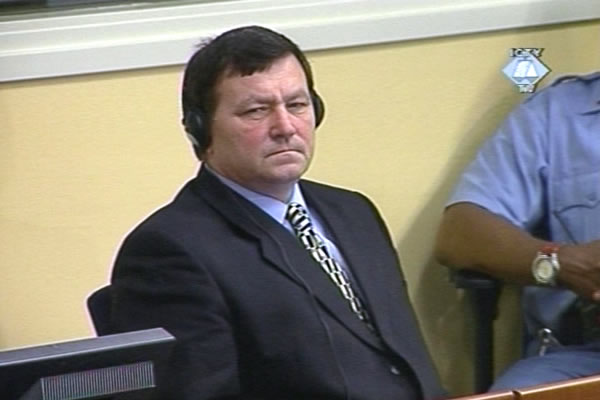Home
MARKAC'S DEFENSE: KRAJINA EXODUS FOLLOWED BELGRADE PATTERN
The defense of former special police commander Mladen Markac denies the existence of a joint criminal enterprise aimed at expelling Serbs from Krajina, shifting the blame for the planning and implementation of the exodus on the RSK and Serbian leaderships. As the defense argues, there is no evidence that Markac perpetrated or covered up crimes during and after Operation Storm
 Mladen Markac in the courtroom of the Tribunal
Mladen Markac in the courtroom of the Tribunal ‘I believe that after we present our case the judges will be convinced of the innocence of my client and will deliver the only fair verdict and acquit him’, Zagreb lawyer Goran Mikulicic said today in his opening statement. Mikulicic is defending Mladen Markac, who commanded the special police, and is now on trial together with generals Gotovina and Cermak for crimes against Serbs during and after Operation Storm in August 1995. The defense will try to refute the charges of a joint criminal enterprise aimed at the permanent elimination of Serbs from Krajina, Mikulicic indicated.
The mass exodus of the Serb civilians, the defense argues, was ‘an implementation of the ideology’ pursued by Serbian president Slobodan Milosevic. According to that ideology, Serbs were supposed to live in one country and the RSK leadership decided to evacuate the population when it became clear that the occupied territories were to be reintegrated into Croatia. The defense intends to call evidence that the first plans for the evacuation were drafted back in 1993. The evidence of this pattern of behavior of the Serb authorities is visible, Mikulicic noted, in the mass exodus of Serbs from other territories Serbs lost: Croatian Podunavlje, Sarajevo or Kosovo. As the defense emphasizes, this proves that the Croatian authorities did not intend to permanently eliminate Serbs. Consequently, Mladen Markac could not have participated in a joint criminal enterprise with this objective.
The defense will also contest the prosecution’s allegations that Serbs who had fled after Operation Storm were prevented from coming back. It will prove instead that the Croatian authorities made every effort to ‘facilitate and motivate’ their return. The defense counsel added in that context that 122,500 Serbs had returned to Krajina by 2000.
Markac’s defense counsel depicted Markac as a ‘highly moral person, a conscientious professional, a dedicated father and husband, a man of no political, religious or racial prejudice’. All this, the defense counsel pointed, led to a conclusion that Markac was unable to commit any crimes. According to the defense, Markac was not authorized to detect and investigate crimes; Markac could only forward any information he received to the judicial bodies. There is no evidence, Mikulicic argued, that the accused knew of crimes and failed to report them or that he ever covered up any unlawful conduct on the part of his subordinates.
Markac’s defense, it was indicated today, will try to prove that the Tribunal had jurisdiction only over crimes perpetrated during Operation Storm, from 5 to 8 August 1995 but not over those committed afterwards. After 8 August 1995, the defense contends, there was a ‘state of internal unrest and tension’, a level of combat below that of ‘armed conflict’ which is prerequisite for the Tribunal’s jurisdiction.
The trial of Croatian generals continues of Tuesday, 2 June 2009, when General Ante Gotovina’s defense will call its first witness, expected to be a former officer of the Yugoslav military counterintelligence service (KOS). In his evidence at the trial of Slobodan Milosevic in September 2002 the witness described the link between the JNA and Serbian police and the events in the RSK.
Linked Reports
- Case : Gotovina et al. - "Operation Storm"
- 2009-05-28 DEFENSE: CERMAK WAS ’CIVILIAN IN MILITARY UNIFORM’
- 2009-05-25 SPECIFIC TARGETS IN 'WIDER AREAS'
- 2009-04-24 GOTOVINA'S DEFENSE INSISTS ON SOLANA’S DOCUMENTS
- 2009-06-02 SERBIAN INTELLIGENCE OFFICER CALLED AS FIRST WITNESS OF GOTOVINA'S DEFENSE
- 2009-06-03 WHO SCARED THE SERBS WITH PROPAGANDA?
- 2009-06-04 WITNESS: LOOTING AND ARSON IN KRAJINA ANGERED TUDJMAN
